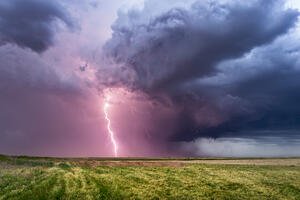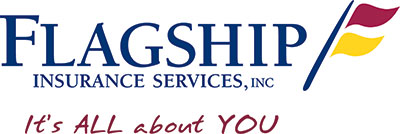
by Flagship Staff | Jul 8, 2020 | Blog
Owning a house makes you realize the significance of ventilation. Improper ventilation in the bathroom can lead to an incessant war with mold and mildew. If your kitchen has insufficient ventilation, the smell of food may remain for days. And if you don’t provide proper vents on the roof, you’ll face several problems, both outside and inside the house. Fortunately, an experienced contractor can fix ventilation issues easily.
If you notice that your house is hotter in the summer and much colder in the winter than expected, or if you go to the attic, only to face an unexpected gush of hot air, then maybe your roof doesn’t have proper ventilation.
Roof ventilation is one of the most critical aspects of keeping your house and loved ones healthy. Unfortunately, problems related to ventilation can prove to be subtle and can develop without your knowledge, surprising you with hefty repair costs.
Why roof ventilation?
Roof ventilation doesn’t only affect your roof, but also your home’s cooling and heating system and the electricity bill. It provides continuous airflow through the attic and helps to remove moisture and overheated air, reducing the aftermath of altering temperatures and moisture formation inside the house.
Proper ventilation releases any heat gathered in the attic during the winter season. Excessive heat present inside your house can melt the snow accumulated on the roof faster and can lead to the formation of ice dams, which isn’t good for your house.
During the summer season, bad roof ventilation often leads to the trapping of heat inside the attic, affecting cooling systems and reducing the energy efficiency of your house.
A good roof ventilation system releases unnecessary heat present in the attic and protects your roof and air conditioning systems.
Sometimes moisture buildup can cause the formation of mold and mildew, causing significant damage to the interior of the attic and substructure of the roof. Nails can rust and even break, and the roof deck can rot. The roof ventilation system allows the moisture and heat to escape, hence reducing the possibilities of such disastrous issues.
Problems caused by poor roof ventilation
Ordinary chores like doing the laundry, cooking, or taking a shower could lead to the formation of moisture and heat inside the house unless a proper ventilation system is present. The accumulated heat and moisture could lead to the following issues:
1. Mildew and mold. A humid environment and the resulting condensation can lead to the formation of mold and mildew. It leads to the decomposition of items in the attic and can also cause severe health issues.
2. Ice dams. They prevent the accumulated snow from falling off the roof and stop the water from the melted snow from flowing down. This water gets accumulated under the shingles which leads to its infiltration inside your house, causing significant damage to the drywall and paint. Also, the ice hanging on the gutters is heavy and may damage the gutters and lead to poor drainage too.
3. Rusting. The moisture and humidity will also collect on metal pipes and nails, leading to the formation of rust. This, in turn, can lead to the failure of venting and plumbing straps.
4. Sagging of the deck. The presence of moisture in the air will ultimately lead to its absorption into roof decks, dissolving the adhesives, spoiling its shape, and making it feel soggy to walk on. This presents a grave threat to anyone who walks on it.
5. Hot and cold spots. Inadequate ventilation can lead to distinguishable changes between different rooms in the same house. Some rooms might feel warm, while others might feel cooler. This can lead to increased electricity expenses.
6. Roof system disintegration. Excess moisture and heat can spoil the shingles and undergirded material which gives support to the attic. The untimely loss of grains or cracking roofing slates indicate inadequate ventilation.
Maintaining roof ventilation systems
You should examine your roof along with the ventilation system every few years. Look for weather abrasion like cracks, absent tiles, and loose or ruptured vents. Also, look for anything that can block the vent like leaves and debris. Check inside the attic for any kind of damage caused by moisture or heat.
The attic insulation is one of the most crucial aspects of your house. Keep that in check for any variations in temperatures around the house. You also need to insulate your house properly to be safe from the temperature outside, so check the proper placement and order of the vents across the roof.
You can obtain the help of roofing companies to resolve any problem related to vents and roofs. Performing a proper check on the roofs can lead to a long-lasting, well insulated, and healthy home for you and your family.

by Flagship Staff | Jun 23, 2020 | Blog
Taking a road trip in an RV is a great way for families to spend quality time together during the summer. With the COVID-19 pandemic, people are looking to avoid crowds. Therefore, RV rentals have increased astronomically.
If you’re a rookie, driving an RV requires skill. It’s unlikely you’ll be able to just drive away without practicing and learning new driving techniques. If you’re a veteran, and own your RV, you know a successful and safe trip takes preparation and planning. The last thing anyone wants is to be stranded thousands of miles from home and unprepared.
Whether you’re a rookie looking to rent an RV or a veteran RV owner, here are some tips for you may find helpful.
RV Types
There are many different types of RVs you can purchase or rent. Selecting the right type for your family depends on what you want to use it for and your budget. If you’re looking for a simple weekend getaway, a pop-up camper may be for you. If you want to spend several months traveling, and want to enjoy the comforts of home, a Class A motorhome will meet your needs.
- Pop-Up – This lightweight camper is great if you have a smaller vehicle and you’re looking for an easy camping experience. Because they pop up and down, you can see clearly behind you while driving. These campers sleep four to six people.
- Truck Camper – If you have a large pickup truck, this camper may be for you. This type of camper fits in the bed of your truck. The benefit of this camper is you don’t have to pull anything behind you. However, you’ll have to rely on your side mirrors. This is a great option for outdoor enthusiasts who want to go deep into the woods, because there’s nothing to tow.
- Travel Trailer – Like the pop-up camper, this is a great option for weekend getaways. They contain some similar home amenities and can be towed by an SUV or pickup truck.
- Class C – This motorhome is great for road trips with your family. It includes many amenities of home and is easy to drive. You can even pull a car behind it.
- Fifth Wheel – A Fifth Wheel includes a bedroom, bathroom, and fully equipped kitchen. It may also have an option for washer and dryer hookups. To pull this, you’d need a half-ton or three-quarter-ton pickup truck.
- Class A – This motorhome provides you with a luxurious getaway. It has all the amenities of home, plus a lot of storage. It even has enough towing capacity to pull a car, small boat, or motorcycle.
Rental Requirements
Like Airbnb and other home rental companies, there are several RV rental companies, such as Outdoorsy, RVshare, and Cruise America. To get started, you can visit their sites and enter your criteria to find the best RV for you. Like renting a home, you’ll need to put down a security deposit. If you return the RV undamaged at the end of your trip, the security deposit will be returned to you.
Like a rental car, insurance is required on an RV. Some rental companies will offer insurance while others may not. If insurance isn’t available, you’ll need to contact your insurance agent to see what coverage is available through your existing insurance company. I recommend doing this early in the rental process so you can select the best coverage for you and avoid being put on the spot.
RV vs. Auto Insurance
Renting an RV is more affordable than buying one, especially if you only want to use it a couple of times a year. If you plan on renting one this summer, talk to your insurance agent about insurance coverage. Your auto insurance policy may provide some coverage for driving-related accidents. Also, your home insurance policy may provide some coverage for your personal property. With this being said, you’ll still need additional liability coverage. If your current insurance carrier doesn’t provide additional coverage for renting an RV, it’ll be available for purchase through your rental company.
License Requirements
Most states don’t have a special license requirement for driving an RV, unless it exceeds a certain weight and length. Click here to see your state’s requirements.
Safety Tips
1. Pay attention to the weather. There are plenty of weather apps available to help you keep track of weather conditions as you travel. Many RV accidents are a result of driving in poor conditions, including heavy rain, high winds, and fog. If you get caught in a pop up storm, or any of these conditions, pull off the road and wait until conditions improve. Lastly, never drive through standing water. It may be more dangerous than it looks.
2. Share trip details with your friends or family. It’s always a good idea to share your travel itinerary with others and to touch base with them throughout your journey. This way, if any problems arise, they may be able to lend a helping hand.
3. Set aside supplies in case of a breakdown. Consider buying extra food, water, and other supplies and keeping them separate. This way, if a breakdown occurs, especially near the end of the trip, you won’t be stranded with limited supplies. Also, if you take prescription medications, make sure you have extras as well.
4. Discuss escape plans. Just like with your home, discuss escape plans with your family in case a fire occurs. Because there may be only one door, alternative points of exit are important. Lastly, don’t forget to identify fire extinguishers and make sure there are working smoke alarms.
5. Create checklists. Getting ready to go on a road trip requires attention to detail. To make sure you’re ready, consider creating checklists. Here are some examples:
- Packing
- Pre-trip inspection
- Post-trip inspection
- Supplies
- Maintenance
- Campsite arrival and departure
Driving Tips
1. Practice, practice, practice. Before heading down the interstate, practice driving in your neighborhood or on less busy streets. This will help you develop a feel for how the unit handles, as well as gain confidence. If you have a large vacant parking lot nearby, consider doing some maneuvers there as well.
2. Watch your speed. Whether driving an RV or towing a camper, monitoring your speed is important. Due to the weight and length of your unit, braking distance can increase significantly. Also, items you have inside can shift during transit causing damage. Lastly, driving at a slower speed, can decrease fuel consumption.
3. Know how tall your RV is. Have you ever seen a tractor trailer stuck under an overpass or its load spilled all over the road because the trailer didn’t have enough clearance? This could easily happen to you. Figure out what you need for clearance before starting on your journey.
4. Don’t cut the corner. When driving straight down the road, your wheels track in the same lane. When you’re making a turn, the rear wheels follow a shorter path than the front wheels. Cutting a corner too short at a minimum could put your wheels on the curb. More severe damage could occur, such as hitting a parked car or driving on someone else’s property.
5. Make small, calculated maneuvers. Always be aware of what’s going on around you. This will allow you to make small methodical adjustments when braking, accelerating, or turning. Panicking and making aggressive changes can cause you to lose control causing significant damage and injuries.
6. Monitor your tires. Driving is one of the most dangerous things we do in our lives. We rely on four tires with a contact patch the size of our hands to keep us travelling down the road safely. Tires can fail due to worn tread, improper inflation, and a vehicle that’s overweight. Make sure to keep these things in mind when you’re travelling.
7. Always use your directional. Because of driving at a reduced speed, drivers behind you may get impatient and try passing you. Always use your directional well in advance so they know what your intentions are.

by Flagship Staff | Jun 16, 2020 | Blog
Learning how to drive is a major milestone in a teenager’s life, symbolizing expanded independence and widened opportunities. While parents are often excited to see their teens reach this noteworthy landmark, their enthusiasm is naturally mixed with a bit of apprehension.
The road can be an unpredictable place for drivers of any experience level, which is why it’s especially crucial for new motorists to develop and practice safe driving habits from the start.
If you’re the parent of a newly-licensed or student driver, it’s important to take steps that’ll help your teen understand which habits will work to keep him/her safe and which risky tendencies are best to avoid.
To help you out, here are a few ways you can assist your son or daughter in cultivating the right patterns on the road:
Lead by Example
As teens prepare to start learning how to drive, they’ll be more interested in observing their parents’ habits in the car. The most important thing a parent can do is lead by example. While most experienced drivers bend the rules from time to time, try your best to follow all the laws and guidelines you’d expect your teen to abide by.
Here are a few things to keep in mind:
- Follow the rules as they’re outlined in the driver handbook. Whether your teen takes a state-approved driver’s ed course or plans to use the handbook to independently study, these guidelines will provide your child with the information he/she needs to pass the written permit test and drivers license exam. Reading through the manual with your teen will help you understand how to maintain consistency with the information your son or daughter needs to grasp.
- Be aware of your actions before you start the car. Adjusting your mirrors, fastening your seat belt, and putting any GPS coordinates into your phone before putting the keys into the ignition is a great way to show your teen how to create a healthy pre-driving checklist. The less fidgeting you have to do while actually operating the vehicle, the safer all parties will be.
- Watch your speed. Most seasoned drivers exceed the speed limit now and again, and while it’s not a good idea for anyone to do so, it’s especially risky for inexperienced drivers who are still learning how to keep up with the flow of traffic and react to other drivers’ actions. Be a good role model for your teenager and follow the speed limit, no matter how tempting it is to give into that lead foot.
- Avoid driving aggressively. Calm and courteous driving helps everyone stay safe on the road, as lashing out at other drivers can lead to dangerous collisions as well as personal confrontations. It’s important to demonstrate that the best way to handle a stressful situation is to stay cool under pressure. Also, be courteous to other drivers by letting other cars safely merge, using your blinkers, and coming to complete stops at stop signs.
- Minimize distractions. Distracted driving is a main contributor to collisions and other unsafe situations while driving, but the good news is that it’s largely avoidable. That being said, studies regularly show that almost all drivers engage in some form of distraction, especially when it comes to their phones. Using cell phones (for any reason), eating/drinking, conversing, daydreaming, grooming, and adjusting the radio/GPS are some of the main distractions drivers engage in. Influence your teen to avoid these habits by abstaining from them yourself. If anything comes up that needs your attention, make a point to pull over to a safe location to handle it without multitasking behind the wheel.
- Only drive when you’re sober and well-rested. Alcohol and drowsiness can both lead to impaired driving, so only drive in front of your teen (or at all) if you’re in an alert state of mind and are capable of making sound judgement calls.
-
Find a Professional Driving School
While each state has different laws regarding when driver’s ed is mandatory, enrolling your son or daughter in a trustworthy, state-approved driving school is almost always beneficial, especially for parents who are dealing with busy schedules.
Parents play an integral role in teaching their teens how to drive, but not every parent is a natural teacher who has ample time to teach someone the complexities of the road. Because of this, many parents find that utilizing a professional driver’s ed program helps balance the responsibility. Driving instructors are specially trained to teach state and national road laws in a way that’s engaging and effective, and most driving school vehicles are equipped with ample safety features, helping to give you peace of mind.
Additionally, teen car insurance is notorious for being expensive, but some insurance providers may lower rates if the adolescent completes certain driver’s ed or advanced driving school requirements.
Practice Driving with Your Teen Whenever Possible
The education and guidance you provide doesn’t have to stop when your teen becomes a licensed driver. Continually driving with your teen and providing advice will help him/her continue to strengthen safe driving habits, and it’ll also allow you to monitor in which areas your child is getting lackadaisical or could use more practice.
Additionally, it’s important to give your son or daughter guidance regarding situations not yet experienced. For example, if your teen took driver’s ed during the summer, the instructor may have mentioned a bit about how to stay safe in the snow without being able to provide hands-on training.
This is why it’s important to practice driving with your teenager if you feel the situation is something that requires more in-depth skill than he/she currently possesses, such as driving during inclement weather or navigating narrow mountain roads.
Stay Informed about Teen Driving Laws
Many states have implemented graduated licensing laws for teens. These laws are designed to minimize distractions while teenagers slowly acclimate to driving independently. Since new drivers lack experience operating a vehicle without supervision, gradually introducing situations that could divert their attention helps them solidify their skills at a safer pace.
Restrictions involve curfew limitations on the times they’re able to drive, the amount of peer passengers they’re allowed to have in the car, and if/how they’re able to use their cell phones.
It’s helpful to familiarize yourself with the local teen driving laws so that you can encourage your child to follow them as necessary.
Demonstrate Proper Vehicle Maintenance
Part of safe driving is ensuring the car that you’re operating is in good mechanical health, as basic maintenance can prevent roadside emergencies. It’ll also minimize the need for expensive repairs.
By showing your son or daughter important maintenance measures, such as when to get the oil changed, how to adjust tire pressure/change a tire, and how to read warning lights/indicators, you’ll help your teen become self-sufficient at caring for a vehicle.
Utilize Automotive Telematics
Parents can track their teen’s driving habits by utilizing automotive telematics, a technology that monitors driver behaviors, such as if someone brakes too hard or accelerates too quickly. Some telematics apps will even give drivers detailed feedback on what they can do to improve their driving.
This can be especially beneficial to parents of newly licensed drivers, as they can see how their teens are driving when they’re not being supervised. Parents can then use that information to talk with their teenagers about any risky behaviors that need to be addressed as well as to commend positive habits.
On a similar note, telematics have shown to reduce the likelihood of collisions. Because this results in fewer insurance claims being filed, some insurance companies will lower the rates of drivers who use their telematics systems and consistently demonstrate good driver behavior.
Draft Up a Driving Contract
When your son or daughter first gets his/her license, you may naturally feel uneasy about him/her driving without your guidance. To help keep your teen safe and put your mind at ease, consider drafting up a driving contract.
These contracts help keep teen drivers accountable to their families by clearly stating what rules they need to follow in order to continue to have the privilege of driving. These should include local laws as well as boundaries imposed by parents.
Common items to address are:
- How many passengers can be in the car with your teen while driving? (Statistics show that teens driving with peer passengers are more likely to be in distraction-related collisions than teens driving alone.)
- What time of the day/night your child is allowed to drive?
- How will your son or daughter let you know where he/she is going? (Emphasize that you don’t want to be texted or called while he/she is driving.)
- A pledge that your teenager will contact you if he/she is not able to safely drive for any reason.
- A commitment that he/she will not ride in a car with anyone who’s intoxicated.
While it may seem like there’s little you can do to make sure your child stays safe once he/she is driving independently, there are numerous steps you can take to encourage your teen to develop and maintain safe habits on the road.
By setting a good example, ensuring your teen learns strong foundational skills, and continuing to monitor his/her driving habits, you’ll be able to help mold your son or daughter into a capable, cautious motorist.

by Flagship Staff | Jun 5, 2020 | Blog
A severe thunderstorm has many damaging and life-threatening perils, such as wind, hail, and lightning. Lightning strikes the United States approximately 25 million times a year. In fact, the Empire State Building gets struck on average 23 times per year. While most lightning occurs in the summer, people can be struck at any time of year.
In the United States, lightning kills 47 people per year and injures hundreds more. While I’ve never been struck by lightning, I’ve had a couple of close calls. My first encounter was as a young boy. My parents asked me to go out onto our deck to bring in the furniture cushions. I didn’t think too much about it until lightning struck our house while I was outside. It definitely was a bright flash of light. Obviously, I dropped the cushions and ran indoors as quickly as I could. While we didn’t know it at the time, the lightning ran through our house burning out all our electronic components. Unfortunately, that put an end to the flashing disco lights on our juke box.
My second encounter was as a young dad living in an apartment complex. My newborn infant was peacefully sleeping in her crib. I went to close her window blinds and suddenly lightning struck the ground outside her window. Shortly after, I smelled smoke coming from our garage. When I went to check it out, I realized the garage door opener was burned out. Luckily, it didn’t start a fire. When I talked to my neighbor the next day, I learned that as a result of the lightning strike, their cordless phone was melted to the base.
While I haven’t won the lottery, you can see from my encounters, lightning can strike anyplace at any time. Here are some lightning myths and safety tips to keep your family safe.
Myths
- Lightning never strikes twice. While each storm produces different lightning strikes, an object can be struck more than once. An object’s size and location can make it an ideal target.
- If I don’t see rain or dark clouds, I’m in the clear. Lightning can travel several miles from the center of a thunderstorm. Even if your skies are blue, if you can hear rumbles of thunder it may be wise to seek shelter.
- Seeking shelter under a tree will keep me safe. While standing underneath a tree will keep you dry from the rain, or provide some protection against small hail, it won’t protect you from lightning. Being struck by lightning while underneath a tree is the second leading cause of lightning related deaths.
- Only tall objects get struck by lightning. Lightning can strike anywhere. However, tall pointy objects do have a better chance of being struck. But as you learned from my encounter above, it can hit the ground and disperse.
- Lightning can’t hurt me if I’m indoors. Staying in your home in an interior room during a storm offers you the best protection. However, if lightning strikes your home, it could run through cables, wires, plumbing, and electrical appliances.
Safety Tips
- Always keep an eye on the weather. Whether you’re taking a day trip or an extended vacation, always be aware of the weather. Not only will it help you pack appropriately, it can keep you and your family safe.
- Seek shelter. As I mentioned above, if you hear a rumble of thunder, it’s time to go indoors. Not only can lightning travel for miles, high wind, hail, and torrential downpours can also be dangerous. If you’re driving, consider pulling off the road and finding a safe location to take cover. If you must remain in your car, avoid touching metal or other surfaces that conduct electricity. Lastly, avoid seeking shelter in tents and pavilions as they don’t provide adequate protection.
- Turn off the water. Since lightning can travel through your home’s plumbing, it’s best to avoid using sinks, bathtubs, and other appliances that use water during a thunderstorm. You can take a shower or finish the dishes once the storm leaves your area.
- Don’t use your electronics or appliances. Avoid using anything that’s connected to an electrical outlet. This includes computers, gaming systems, and household appliances. Lightning can travel through your home’s wiring. Grab a book to read, or simply relax until the storm is over.
- Scatter. If you’re enjoying a family reunion and a storm quickly rolls in, scatter. Lightning can strike the ground and disperse causing injury. By moving apart, you can reduce the number of injuries to your family.
- Don’t forget about your pets. If your pet loves being outside, don’t forget about it as you scramble to close your windows. Dogs that are on metal runners or that are leashed are more susceptible to lightning strikes.
- Call 911. If your house is struck by lightning and you think a fire may have started, get your family to safety, and call 911 immediately. Don’t spend too much time investigating or trying to put it out yourself.






 Below are links to updates on legislation, regulation and guidance on both the federal and state levels in response to COVID-19.
Below are links to updates on legislation, regulation and guidance on both the federal and state levels in response to COVID-19.